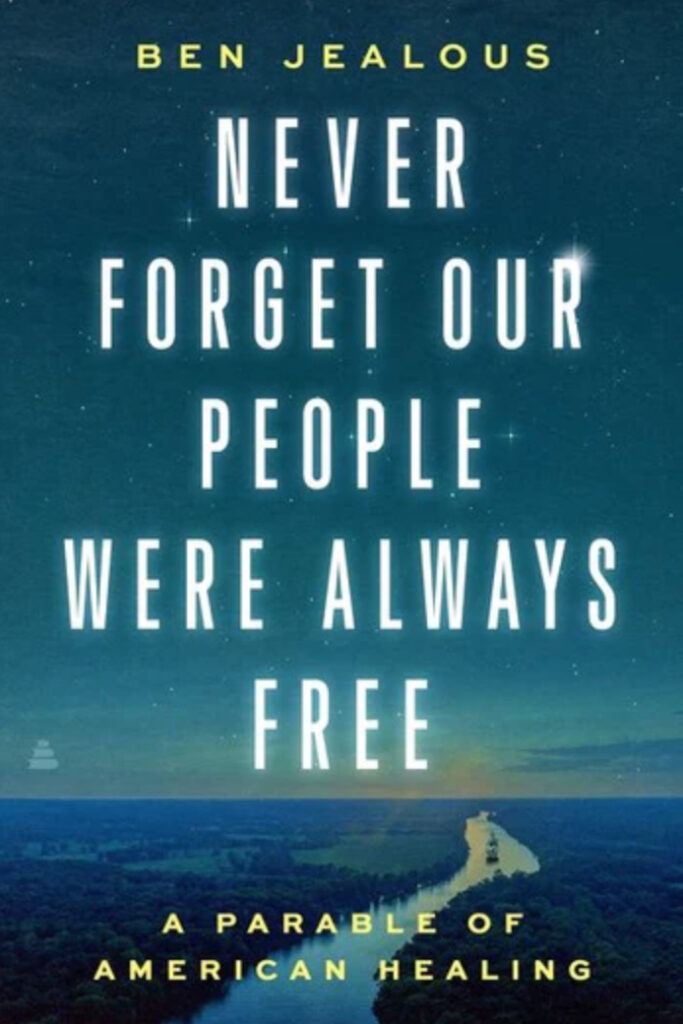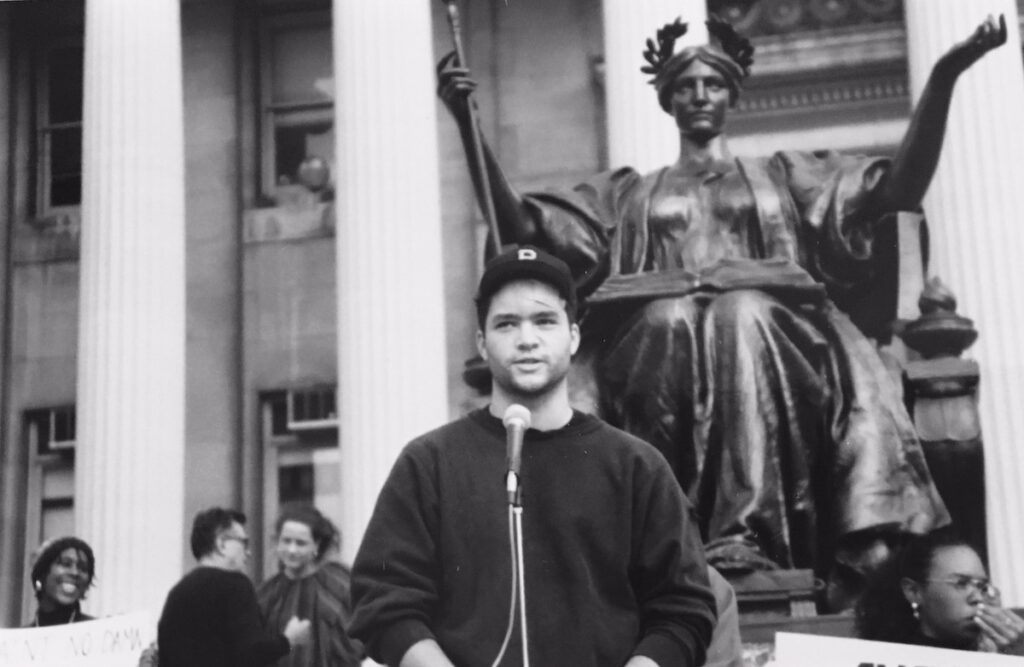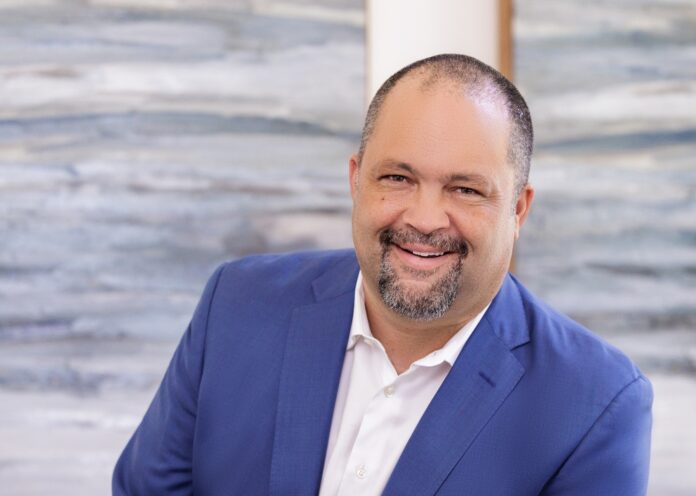Admittedly, I’m jealous of Jealous—even more so after a phone conversation with him. I’m referring to Ben Jealous: civil rights leader, scholar, writer, and the youngest-ever elected National NAACP President (2008 to 2013). He’s also a former journalist and executive director of the National Newspaper Publishers Association, the first person of color to serve as executive director of the Sierra Club and, remarkably, there’s even more to his stellar resume. He’s currently on the line with me speaking about his new book Never Forget Our People Were Always Free: A Parable of American Healing (256 pages, HarperCollins Publishers).
Jealous remains optimistic—idealistic, even—that the United States can find a path to racial justice and national healing. To him, it’s matter of adopting a new logical, national mindset. His book is an argument full of personal stories and observations. It is a memoir of a son whose parents are biracial, of growing up Black in 20th and 21st century America. It’s an ode to his marvelous Grandma Mamie who died in August 2022 at age 105, whose optimism he inherited and whose “always free” message titles the book. It is also a book stoked with facts and purpose to sweep away misconceptions about incarceration, gun violence, capital punishment, suicide, social isolation, colonialism, rebellion, indentured servitude, slavery, and the invention of the concept known as race that has fed racism’s fire.
To read Never Forget is to gain awareness and insight through stories, not pedantic lecturing or moralizing “shoulds” and “should nots.”
Below is our conversation, edited slightly for clarification.
48 HILLS Tell me about this new national mindset you write in the book will lead to unity and reduce racism.
BEN JEALOUS It’s just a mindset; people ultimately have to recognize that race as we know it was created to divide most of the people in the colonies and ultimately in our nation. That was the purpose. The first century in Virginia, where my mom’s family is from, white European indentured immigrants and enslaved Black Africans kept coming together to rebel. In rebelling together, they made up a majority of the people in the colonies. For the colonists, for the plantation owners, for the king himself it was a major threat. They tried to separate them with the military, new laws, and it didn’t quite work. They reached for the cudgel that is culture. They literally changed the meaning of a word that was already more than half a millennia old. When race came into European language, it started as “razza” [“lineage, family”] and eventually became race.

48 HILLS How can we apply that type of thinking on a grassroots, street-level level?
BEN JEALOUS People have to step back, recognize race had a purpose, and then choose to look beyond it. In business, it causes people to invest in “enlightened narcissism.” So often, people invest in people who remind them of themselves when they were young because they look like them. But when you ask someone to describe what they love about themselves, it’s rarely their hair, eye, or skin color—or even where they went to college. It’s usually some aspect of their character, intelligence, or grit. That’s the book beyond the cover. The innovation is deciding to act as if people can bring great value to your life and world, even if they don’t look like you, practice a different religion, are a different gender. That’s an innovation: inventing a different way of being than they were trained to be from birth on.
My book doesn’t lecture people as to “this is wrong, this is right.” What works is just deciding, diving in, and letting their experiences validate their faith that they will be happier and more productive if they open themselves up to the possibility that people on another side of racial divide have just as much to offer.
It’s what I teach, literally. The nations often talk about themselves as families. But the fissure that runs through our national family and that holds us back is race. It was intentionally inserted to weaken most of us so a few of us might remain insanely wealthy. Kings and plantation owners and now, the would-be oligarchs. My hope is that one day we will start acting like one family. The book is written in part to show how close we are and presume we have nothing in common with people are nothing like us.
It’s the simplest solution: act like other people could be our cousin, our family. For me, that started with meeting someone like Maggie Bland. Someone from the other side who was part of my family. [In the book, Jealous relates how he met Bland and her husband at a Renaissance Weekend, one of the events organized by Bill and Hillary Clinton that brought leading movers and thinkers together to brainstorm about ways to move the nation forward. Learning of his tablemate’s lineage, he said to Bland’s husband, “I think your wife’s family used to own my mama’s family.”]
48 HILLS You did a lot to improve digital access and social media capabilities at the NAACP and while leading the National Newspaper Publishers Association. What was most valuable and provided opportunity for continued improvement?
BEN JEALOUS In media, the most powerful, transformative thing we did with Black newspapers was we brought them online, empowered them to exchange stories in real time. But we never got to sharing photographs. The most powerful thing media can do now to heal our nation is to actually show the images that represent an entire social problem.
Before the cvili rights movement the images of the poor were always white; after the civil rights movement, images of the poor were almost always Black people, occasionally Brown, never white. In the case of poverty, the largest group by far has tremendous negative effects. When media represents the full problem it has tremendous, immediate effect. When sheriffs released images of everyone dying of opioid addiction, the sudden appearance of faces of young white people dying by the dozens dying every day from heroin abuse shifted the public from pretending heroin was just a scourge in Black communities and treating it like a crime, to acknowledging it was effecting all communities and treating it like a health crisis. An addiction, for which rehab was the answer, not prison time.
It seams so simple and yet it’s so hard because, frankly, well-educated elites like myself are still stuck on stupid when it comes to who they think is being hurt by something. There are almost twice as many whites in poverty as there are Blacks The group of people defined by race and gender who are most likely to die at the wrong end of a gun, are not Black men and boys from homicide. It’s White old men from suicide. Yet, we never talk about that. If we did, it would have a tremendous impact on the conversation about handgun deaths in the United States. In tech, we say if the mindset is wrong, the enterprise will fail.
We are blind to poverty and hand gun deaths in the white community. We’re blind to talent in the Black community, unless it’s in entrainment or sports. The end result is our nation is diminished in ways that impact every community.

48 HILLS What are your thoughts on police reform?
BEN JEALOUS People for the American Way, in their report All Safe: Transforming Public Safety For All publication, said the bottom line is that when it comes to police officers wrongfully murdering civilians, the number one issue is authoritarianism. That has a brutal impact on low income communities of all colors. And on people of color and it’s harshest impact is on low income Black folks by far. People of color are frequently abused.
48 HILLS Are we stuck on the topic and other issues, such as mass incarceration?
BEN JEALOUS Our country has moved forward in a lot of ways, however, we need to listen to Black criminologists like Philip Yanos at CUNY’s John Jay College of Criminal Justice who have been saying for decades when it comes to the police killing people, authoritarianism is a much bigger problem than racism. Thus, five Black police officers and Tyre Nichols. It’s hard to imagine five Black officers were lethally racist. What we saw is that they were lethally authoritarian.
Mass incarceration, we made progress for decades. Unfortunately now it is veering back to becoming a political football, as Donald Trump resurrects his willingness to tells lies, just as he did with the Central Park Five. He has brought back a retrograde politic similar to the 1980s and the old Willie Horton ad.
However, the people of the country are moving forward. The antiracist demonstration rallies after the killing of George Floyd became multiracial and visibly larger. And even in very conservative areas, interracial families are increasingly common. As a guy whose parent’s marriage was illegal in their home state, that’s a significant development. Matters of race in this country are two steps forward, one step back. The things we’ve tried, educating people, protesting, changing laws; we still haven’t shifted our national mindset.
When you’re in England, they’re quick to deny they have race problem, yet it’s obvious. In America, we deny having a class problem and it’s obvious we have one. But our race problem makes us blind to that. Whatever the issue is, we only let people see one or two demographics suffering it. Our families have more in common than they don’t, so showing the full face of problems would help build greater unity and accelerate solutions. The price paid to keep race blinders on is immense. Numerically, the problem of being trapped in poverty is faced by twice as many whites as Blacks.
48 HILLS Describe the responses you receive when it comes to your coalition-building, unified approach. What is the response to your premise that racism in America has as its predecessor colonialism, and your writing that women need men and Black people need White people to join with them in order to succeed in fighting sexism and racism.
BEN JEALOUS What I repeat is what my father said. If women could have eliminated sexism by themselves, they would have. If Black people could have ended racism, they would have a long time ago. So it will take some men to help to end sexism and some Whites to end racism. It’s just logical.
A lot of people haven’t thought about it that way. They pause, but they get it. We spend time talking about the people hurt most violently by racism. We never think about how it hurts other groups, holds the nation back, hurts the white poor by denying them powerful allies. When you point it out, it makes sense. Everyone knows that for kings or governments to maintain a colony, it was divide and conquer. We never talk about racism as a legacy of colonial strategy. And yet our history books make that clear.
We live our lives on the dance floor, on the street, but when you invite people up to the balcony to get a bird’s eye view, the truth is easy to see. I’ve had this conversation with a wide range of progressives and conservatives and when you share the information though personal stories and our history, it’s easy for people to digest. Folks are hungry for it because the insanity that is racism diminishes all our lives. Wherever that friction appears, it’s not a good experience. I have found people on either side of any divide—racial, political, geographical—the response has been universally positive.
48 HILLS A common question: Why did you write the book and why now?
BEN JEALOUS I wrote the book because my own life had been limited by the accumulated familial trauma of slavery, segregation, and discrimination. My paternal grandfather died at 43 due to his third heart attack. When I was 41, my blood pressure was 186 over 90 when I was resting. I appeared to be on path to die as he had done. I made a few adjustments and had surgeries and now it is 127 at age 50. I decided it was time to dig in and figure out how to move the country forward.
The attempted coup on January 6 added urgency. My neighbors were talking about a second Civil War. I needed to write a book that my favorite uncle who’s white and likely voted for Trump could hand to his friends, a book that if Martin Luther King, Jr. was still alive he could hand to his jailer. A book to show we would all profit from shifting our national mindset and deciding to come together in a way that’s as easy as practicing the Golden Rule and yet, one that has fundamentally been impossible for people to do at a mass scale.
48 HILLS Let’s finish with hope. Where do you find yours?
BEN JEALOUS Hope is a secular word for faith. The innovation is following the Golden Rule. We want our courage quickly validated. That’s all but impossible, so what sustains us when we decide to live our lives differently? Faith. The only way we can lead the world in this century is by getting flatter faster. Uniting faster. Coming across old lines of division faster. The only way to do that is to practice the Golden Rule.
I’m a Christian and Jesus was very clear in the parable of the Jericho road that the good Samaritan figured out that his neighbor was not just the person walking next him, it was also the stranger in the ditch. The moment we decide to practice the Golden Rule is the moment lives change radically for the better and we start moving our nation forward with reason to have great hope for its future.
NEVER FORGET OUR PEOPLE WERE ALWAYS FREE: A PARABLE OF AMERICAN HEALING is available at bookstores and online now. More info here.








